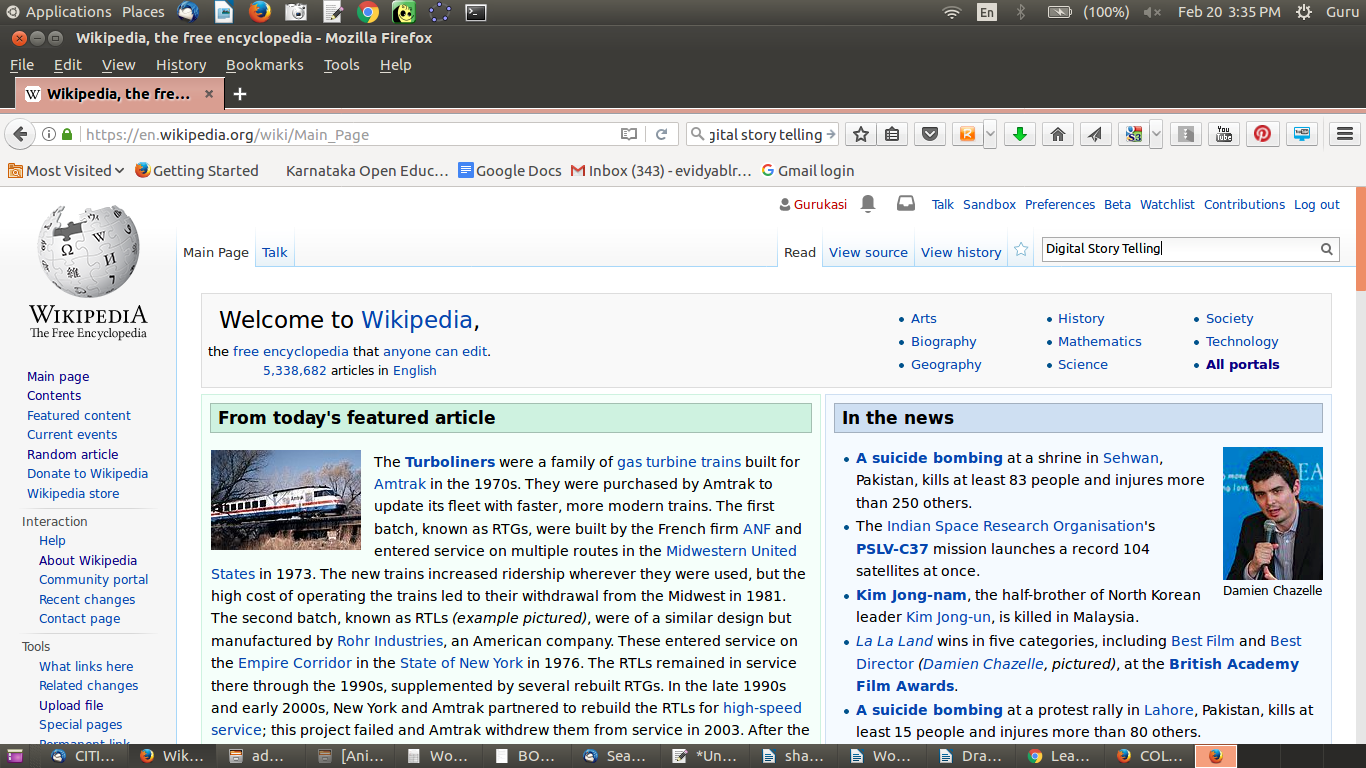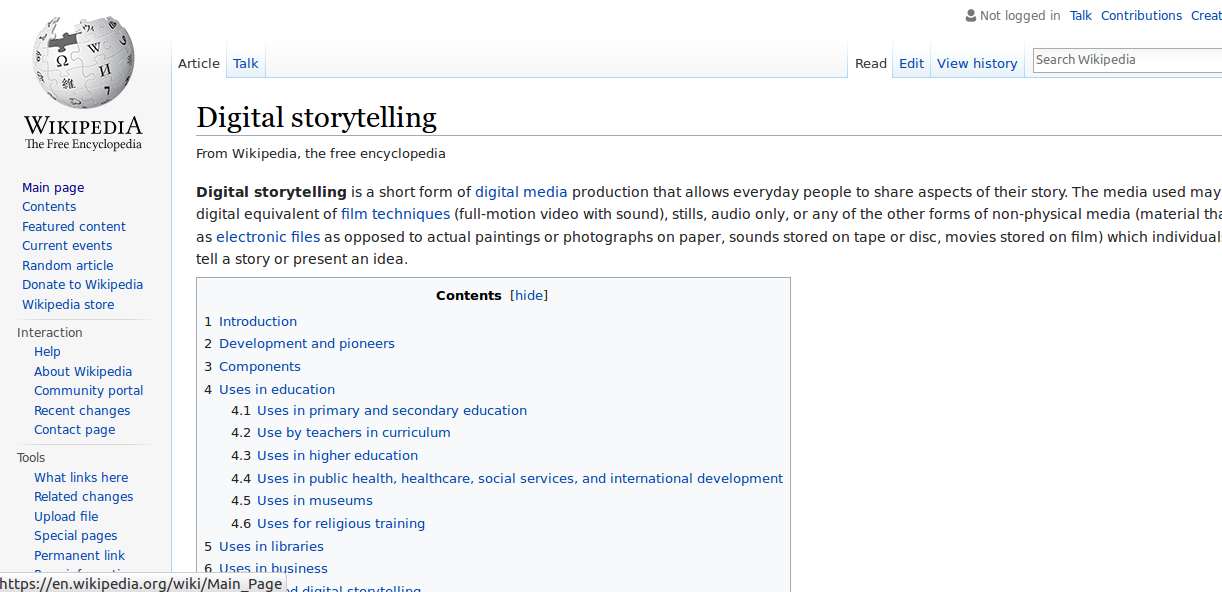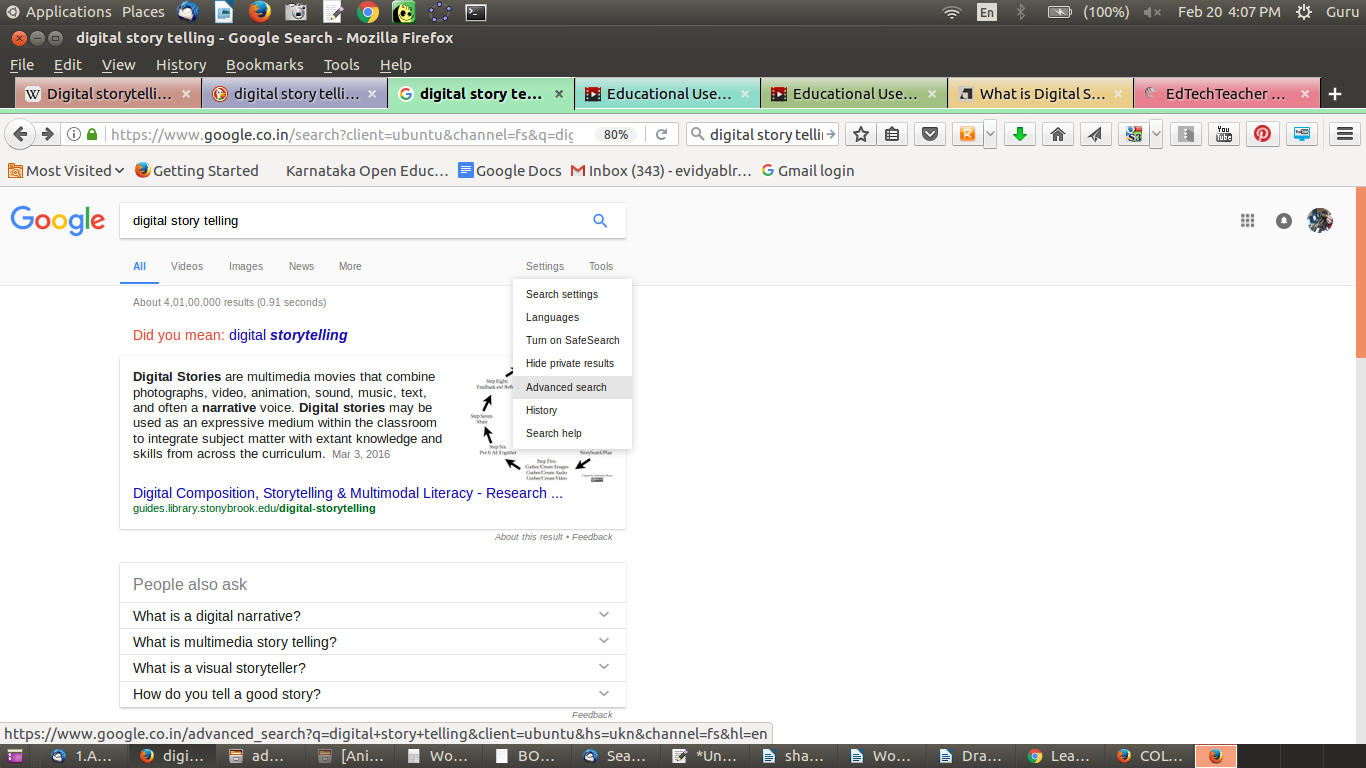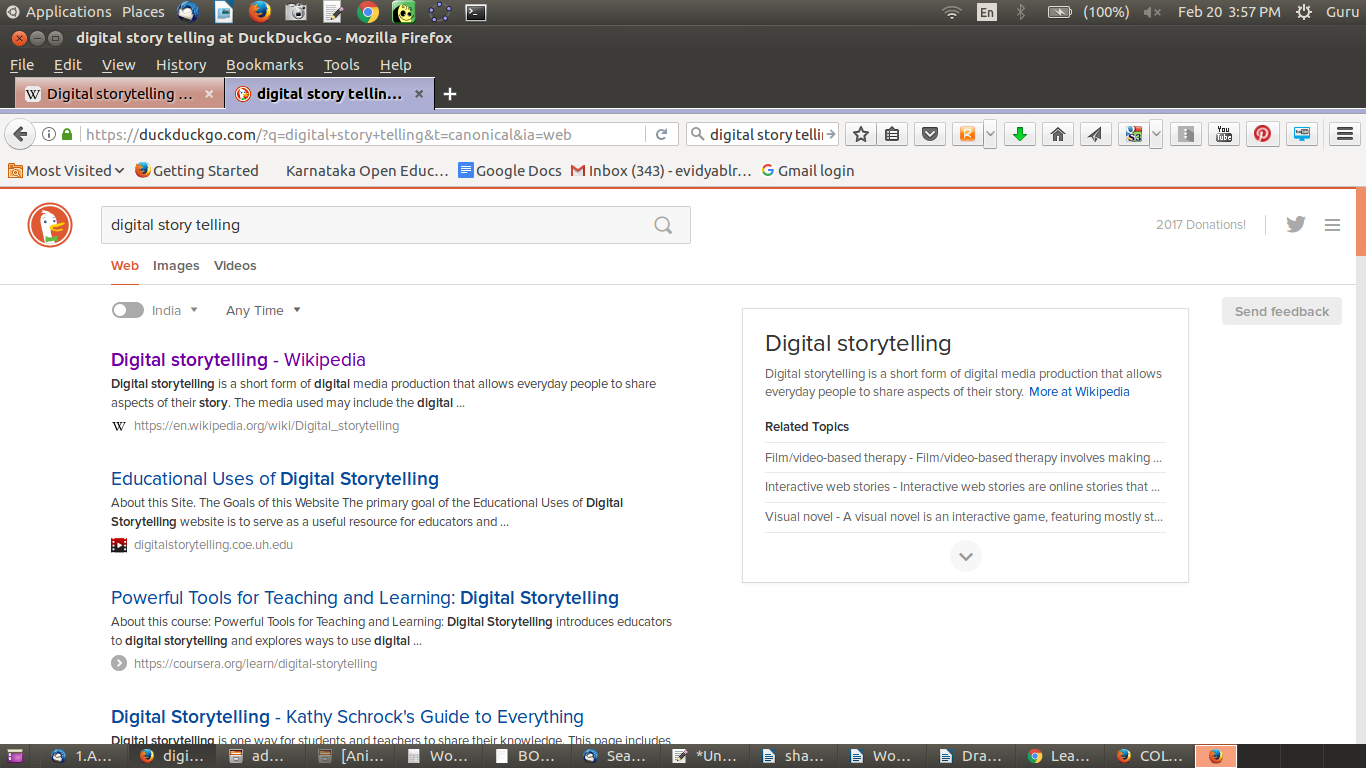Difference between revisions of "User:Yogi/Text OER"
| Line 21: | Line 21: | ||
One method of accessing existing OER is to search some text repositories. The most popular text OER repository is the digital encyclopedia, Wikipedia. You can search for your topic in Wikipedia, by simply typing this text in the search bar. We will do this for ‘Digital Story Telling’ (DST) which is the OER proposed to be created as an exemplar by this tool-kit. | One method of accessing existing OER is to search some text repositories. The most popular text OER repository is the digital encyclopedia, Wikipedia. You can search for your topic in Wikipedia, by simply typing this text in the search bar. We will do this for ‘Digital Story Telling’ (DST) which is the OER proposed to be created as an exemplar by this tool-kit. | ||
| − | + | [[File:COL_-_Searching_in_Wikipedia.png|frame|Wikipedia page]] | |
| − | File:COL_-_Searching_in_Wikipedia.png|Wikipedia page | + | [[File:TextOER1.png|right|frame|Digital Story Telling page on English Wikipedia]] |
| − | File:TextOER1.png|right|Digital Story Telling page on English Wikipedia | ||
| − | |||
Wikipedia is available in more than hundred other languages, so you may also be able to search for text OER in your native language. | Wikipedia is available in more than hundred other languages, so you may also be able to search for text OER in your native language. | ||
| Line 32: | Line 30: | ||
====Searching the web for OER==== | ====Searching the web for OER==== | ||
In addition to accessing OER on Wikipedia, you could also use a search engine such as Google search engine or DuckDuckGo search engine to access information. You could look for information by simply typing in Digital Story Telling in the search bar of the search engine; shown below are examples of how a search for "Digital Story Telling" would look like. | In addition to accessing OER on Wikipedia, you could also use a search engine such as Google search engine or DuckDuckGo search engine to access information. You could look for information by simply typing in Digital Story Telling in the search bar of the search engine; shown below are examples of how a search for "Digital Story Telling" would look like. | ||
| − | + | ||
| − | File:COL_-_Google_Search_-_Adavance_Search_for_OER_1.png|DST using Google search engine | + | [[File:COL_-_Google_Search_-_Adavance_Search_for_OER_1.png|frame|DST using Google search engine]] |
| − | File:COL_-_Searching_DST_using_DuckDuckGo_search_engine.png|DST using DuckDuckGo search engine | + | [[File:COL_-_Searching_DST_using_DuckDuckGo_search_engine.png|frame|DST using DuckDuckGo search engine]] |
| − | + | ||
The search engine will retrieve web pages for your topic that are both OER and non OER and you need to check each result you want to use, if it is OER. | The search engine will retrieve web pages for your topic that are both OER and non OER and you need to check each result you want to use, if it is OER. | ||
When you visit any site returned by the search results, you need to look for copyright information to ascertain that the resource is OER and you can re-use it. If the resource is not explicitly declared to be an OER (allowing you to re-use), you should not use it in making your OER. | When you visit any site returned by the search results, you need to look for copyright information to ascertain that the resource is OER and you can re-use it. If the resource is not explicitly declared to be an OER (allowing you to re-use), you should not use it in making your OER. | ||
Revision as of 04:07, 22 March 2017
Text is an important resource format and often OER have begun with digitizing of text materials - textbooks, papers, etc. While the digital allows creation multiple kinds of resources, text still holds an important position in terms of content creation. Textual OER includes text documents, web pages, PDF documents, spreadsheets and other resources which are primarily text based. Currently a large amount of textual OER is created using proprietary formats and made available in proprietary or PDF formats. PDF formats do not easily enable editing and hence limit re-purposing. In addition, in the absence of licensed proprietary applications, these OER may not be able to be legally reused or modified. Using free and open source tools to create textual OER can allow more and more users to create content; this can also support the expansion of the universe of OER creation in languages other than English.
One important advantage of the digital tools is the possibility of creating different kinds of textual resources. We are no longer thinking of linear typed text alone; it is now possible to create concept maps, flow charts, diagrams, combine text and images and create an info-graphic and so on. The hypertext which makes web pages possible is also another form of text. In this chapter of the toolkit, we will look at how to access, create and re-purpose textual OER; all the tools discussed are basically text editing tools.
Objectives
By the end of this chapter, you will be able to
- access text OER from popular repositories
- create your personal digital library for organizing your OER
- access, create and re-purpose concept maps using concept map editor (Freeplane)
- access, create and re-purpose text resources using a text editor (LibreOffice Writer).
- present text resources in a ‘slide presentation’ format (LibreOffice Impress)
Your personal digital library for OER
As a part of using this tool-kit to learn FOSS tools and create OER, you will be accessing and creating many documents / files. It is necessary for you to organize these files carefully on your computer so that you can access them easily later. You should create a folder on your computer with the <name of the topic> that you would like to create OER on; this can have sub folders for ‘Text OER’, ‘Image OER’ and ‘Audio Video OER’ for saving your save your text, image, audio and video files respectively. By organizing your files and folders carefully on any topic, you are creating what can be termed as a ‘Personal Digital Library’ on that topic. Having personal digital libraries allows you to access and re-use OER easily and effectively. You could instead create sub folders for different sub-topics for your topic and save your files based on the sub topic. For instance, the topic 'energy' could serve as the name of your folder, within which you could create sub-folders for heat, light, magnetism, electricity etc. You should think about the way you would want to access your OER later, and create the sub-folders (and sub sub-folders) on basis of this hierarchy.
In the last chapter on ‘Publishing OER’, we will explain how you can upload these resources on the world wide web, which can be considered as the ‘Global Digital Library’ accessible to anyone with connectivity.
Accessing text OER repositories
An OER creation process begins with reuse of existing OER; the Internet is a rich source of text OER. It is important to access OER while creating your own because you cannot use content not licensed for reuse. You could either access popular known OER repositories or you could search the internet for resources you want. A browser is needed for accessing the internet, a free and open source browser is Mozilla Firefox.
Search from known repositories
One method of accessing existing OER is to search some text repositories. The most popular text OER repository is the digital encyclopedia, Wikipedia. You can search for your topic in Wikipedia, by simply typing this text in the search bar. We will do this for ‘Digital Story Telling’ (DST) which is the OER proposed to be created as an exemplar by this tool-kit.
Wikipedia is available in more than hundred other languages, so you may also be able to search for text OER in your native language.
Other popular OER sites include http://www.wikieducator.org, https://oercommons.org. A list of OER sites is available on http://www.searchoer.com/list-of-oer.html.
Searching the web for OER
In addition to accessing OER on Wikipedia, you could also use a search engine such as Google search engine or DuckDuckGo search engine to access information. You could look for information by simply typing in Digital Story Telling in the search bar of the search engine; shown below are examples of how a search for "Digital Story Telling" would look like.
The search engine will retrieve web pages for your topic that are both OER and non OER and you need to check each result you want to use, if it is OER.
When you visit any site returned by the search results, you need to look for copyright information to ascertain that the resource is OER and you can re-use it. If the resource is not explicitly declared to be an OER (allowing you to re-use), you should not use it in making your OER.



